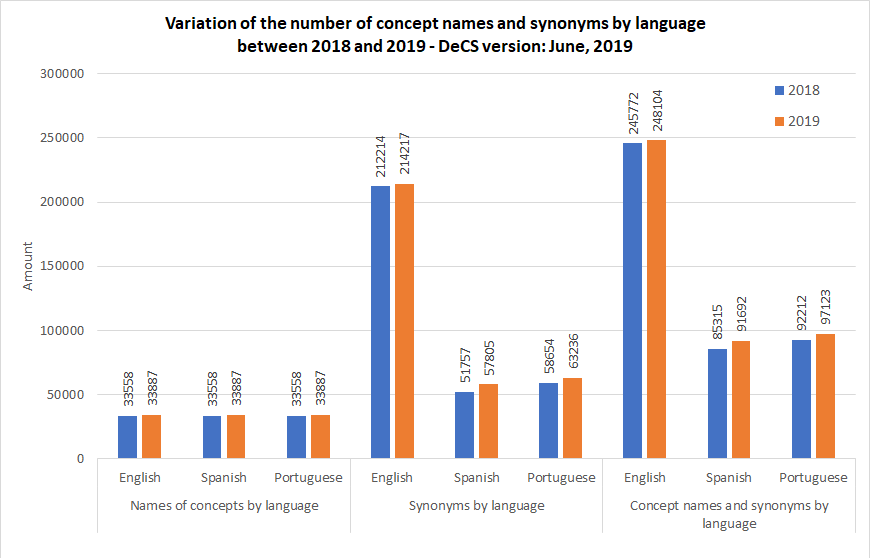The 2019 edition of the Health Science Descriptors (DeCS) – DeCS 2019 – was launched in June, with innovative technological and terminological features. Six hundred and nine new descriptors were incorporated to this edition, among which 189 come from projects aligned to the activities and programs of the Pan American Health Organization and 422 come from the annual updates of the Medical Subject Headings (MeSH), integrated after an extensive study of harmonization with preexisting terms from the DeCS.
Forty descriptors were included to the Digital Health spectrum and 29 descriptors were included to the Gender spectrum, broadening the scope and specificity of these current topics, in addition to many other terms inserted as synonyms or alternative terms.
Throughout the DeCS hierarchy, 57 descriptors were added to cover the strategic guidelines of PAHO towards Universal Health Access and Coverage, and 31 descriptors were added to cover the field of Equity.
Furthermore, within the framework of a Technical Cooperation Term between the Fundação Nacional da Saúde (FUNASA) and PAHO/WHO Brazil, 26 descriptors on Public Health Engineering and Environmental Health were added to DeCS, especially under the exclusive subcategory Environmental Health (SP4).
 Due to an increase in the number of descriptors coming from the aforementioned projects, among the 10 categories that received the most new descriptors in 2019, 38% of descriptors were inserted into exclusive DeCS subcategories.
Due to an increase in the number of descriptors coming from the aforementioned projects, among the 10 categories that received the most new descriptors in 2019, 38% of descriptors were inserted into exclusive DeCS subcategories.
Up until 2018, the National Library of Medicine (NLM) used an online software, MeSH Translation Maintenance System (MTMS) for the integrated translation of the MeSH terms by the collaborating centers into the 15 languages of the Unified Medical Language System (UMLS) metathesaurus. In addition to the multi-lingual characteristic of this system, it was adapted to reflect the structure change, which was formerly based on terms and is now based on concepts. The use of this system was discontinued in 2018. In 2019, the NLM will continue to render available the MeSH documents in a single shipment in mid-July, with all updates effectuated during the year, but it will receive documents with translated terms and other modifications through a new channel.
In 2019, in response to the NLM changes, BIREME/PAHO/WHO developed a tool for creating and administrating one or more multi-lingual thesauri, following the model of data elements provided by the MeSH. Besides the administrative implications, this also expanded the possibility of using unpublished information contained in the XML MeSH documents in English, Spanish, Portuguese, and French, unused before due the limitations of the former management system.
According to Renato Murasaki, Manager of Methodologies and Information Technologies and Information Source Administration of BIREME, “this development will create BIREME capacity to improve the interoperability mechanisms of the information sources and the integration of new vocabulary in content indexing, in order to offer a management service of thematic thesauri on health sciences that complement DeCS/MeSH and respond to the specific needs of the Thematic Networks of the Virtual Health Library (VHL)”.
Related articles
DeCS 2018 is available online. BIREME Bulletin n° 20. Available at http://boletin.bireme.org/en/2018/05/28/decs-2018-is-available-online/